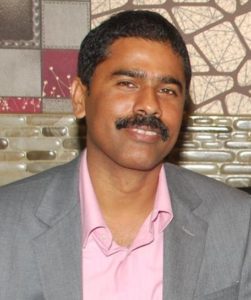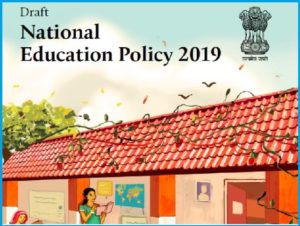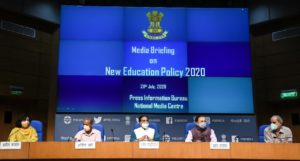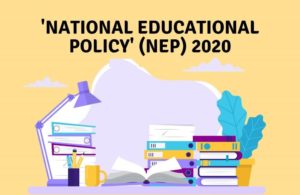India & World UpdatesBreaking NewsFeature Story
National Education Policy in the light of Vivekananda’s ideas on education, writes Niharendu Dhar


Jan. 11: “Education is the manifestation of perfection already in man” to me and for that matter to many others these electrifying words of the Vedantic and visionary monk Swami Vivekananda capture most comprehensively the meaning and purpose of education. From time immemorial this sermon of Vishnu Purana seems to influence our thinking on education, “Sa vidya ya vimuktaye” (knowledge is one that liberates). It is generally agreed that the basic intent of education should be to liberate human mind and the dormant spirits and help us to evolve as complete human beings.
The National Policy on Education (popularly known as NEP 2020), which has been approved and adopted by the Government of India on 29 July 2020, is a significant step in realizing the ideas on education advocated by Swami Vivekananda more than hundred years back. And not surprisingly, it has found resonance in the very first line of the NEP thus, “Education is fundamental for achieving full human potential.”
 Vivekananda was utterly disappointed with the system of education prevalent in India during his time, when India was under colonial British rule and had been following the pattern of education introduced by Macaulay, aimed primarily at producing a supply chain of clerks only. He gave expression to his displeasure in the following way, “The present system of education is all wrong. The mind is crammed with facts before it knows how to think. Control of mind should be taught first. If I had my education to get over again and had my voice in the matter, I would learn to master my mind first and then gather facts if I wanted them. It takes people a long time to learn things because they can’t concentrate their minds at will.”3 On a different occasion he put forward his idea on the type of education that he felt necessary for the people in the following words: “Education is not the amount of information that is put into your brain and runs riot there, undigested, all your life. We must have life-building, man-making, character-making assimilation of ideas.”
Vivekananda was utterly disappointed with the system of education prevalent in India during his time, when India was under colonial British rule and had been following the pattern of education introduced by Macaulay, aimed primarily at producing a supply chain of clerks only. He gave expression to his displeasure in the following way, “The present system of education is all wrong. The mind is crammed with facts before it knows how to think. Control of mind should be taught first. If I had my education to get over again and had my voice in the matter, I would learn to master my mind first and then gather facts if I wanted them. It takes people a long time to learn things because they can’t concentrate their minds at will.”3 On a different occasion he put forward his idea on the type of education that he felt necessary for the people in the following words: “Education is not the amount of information that is put into your brain and runs riot there, undigested, all your life. We must have life-building, man-making, character-making assimilation of ideas.”
 It may not be out of place to mention here that the NEP drafting committee seems to take a cue from the above while putting emphasis on conceptual understanding rather than rote learning and learning-for-exams. The NEP has also highlighted the importance of creativity and critical thinking to encourage logical decision making and innovation, which is again a tribute to the ideas and rational thinking of Vivekananda. While giving expression to his thoughts on the need of a vibrant education system, what Vivekananda said in a very clear and emphatic voice is worth recalling here. He said, “We want that education by which character is formed, strength of the mind is increased, the intellect is expanded and by which one can stand on one’s own feet.”
It may not be out of place to mention here that the NEP drafting committee seems to take a cue from the above while putting emphasis on conceptual understanding rather than rote learning and learning-for-exams. The NEP has also highlighted the importance of creativity and critical thinking to encourage logical decision making and innovation, which is again a tribute to the ideas and rational thinking of Vivekananda. While giving expression to his thoughts on the need of a vibrant education system, what Vivekananda said in a very clear and emphatic voice is worth recalling here. He said, “We want that education by which character is formed, strength of the mind is increased, the intellect is expanded and by which one can stand on one’s own feet.”
 These invigorating words again stressed on the need for ushering in and establishing an educational system that enables not only realization of full human potential but also development of individual who is capable of facing the challenges of life independently, courageously and effectively. The NEP 2020 lays particular emphasis on the growth of creative potential of every individual alongwith life skills such as communication, cooperation, team work, resilience, leadership etc, which are vital requirements for building a sound personality. It is based on the principle that education must develop not only cognitive capacities, but also social, ethical and emotional capabilities and dispositions.
These invigorating words again stressed on the need for ushering in and establishing an educational system that enables not only realization of full human potential but also development of individual who is capable of facing the challenges of life independently, courageously and effectively. The NEP 2020 lays particular emphasis on the growth of creative potential of every individual alongwith life skills such as communication, cooperation, team work, resilience, leadership etc, which are vital requirements for building a sound personality. It is based on the principle that education must develop not only cognitive capacities, but also social, ethical and emotional capabilities and dispositions.
 The principles on which NEP 2020 is based proclaim that the purpose of the education system should be to develop good human beings capable of rational thought and action, possessing compassion and empathy, courage and resilience, scientific temperament and creative imagination with sound ethical moorings and values. It aims at producing engaged, productive and contributing citizens for building an equitable and plural society as envisaged by the Constitution.
The principles on which NEP 2020 is based proclaim that the purpose of the education system should be to develop good human beings capable of rational thought and action, possessing compassion and empathy, courage and resilience, scientific temperament and creative imagination with sound ethical moorings and values. It aims at producing engaged, productive and contributing citizens for building an equitable and plural society as envisaged by the Constitution.
 Commending the NEP 2020, the Pro Chancellor of Ramakrishna Mission Vivekananda Educational and Research Institute, Kolkata, Swami Atmapriyananda told in a webinar that it “reflects the vision of Swami Vivekananda who had dreamt of an education system as a mix of tradition and modern scientific knowledge.” He went on to add that, “the education system that was dreamt by Swami Vivekananda is on the anvil now. Swamiji dreamt of an education system which will be a combination of age-old tradition with modern scientific knowledge and this has been given a proper shape in the new education policy.” The Vice President of India Sri Venkaiah Naidu echoed same while hailing the NEP in a lecture recently.
Commending the NEP 2020, the Pro Chancellor of Ramakrishna Mission Vivekananda Educational and Research Institute, Kolkata, Swami Atmapriyananda told in a webinar that it “reflects the vision of Swami Vivekananda who had dreamt of an education system as a mix of tradition and modern scientific knowledge.” He went on to add that, “the education system that was dreamt by Swami Vivekananda is on the anvil now. Swamiji dreamt of an education system which will be a combination of age-old tradition with modern scientific knowledge and this has been given a proper shape in the new education policy.” The Vice President of India Sri Venkaiah Naidu echoed same while hailing the NEP in a lecture recently.
 The Vision Statement incorporated in the NEP 2020 adequately and emphatically endorses what has been stated above. It says: “The National Education Policy envisions an education system rooted in Indian ethos that contributes directly to transforming India, that is, Bharat, sustainably into an equitable and vibrant knowledge society, by providing high quality education to all and thereby making India a global knowledge superpower.”The principal objective of the NEP is to instill among the students and the learners a deep-rooted and genuine pride in being an Indian, not only in thought but also in action, intellect and spirit and to develop knowledge, attitudes, skills, values, dispositions etc that inculcates responsible commitment to human rights, sustainable development and global well being.
The Vision Statement incorporated in the NEP 2020 adequately and emphatically endorses what has been stated above. It says: “The National Education Policy envisions an education system rooted in Indian ethos that contributes directly to transforming India, that is, Bharat, sustainably into an equitable and vibrant knowledge society, by providing high quality education to all and thereby making India a global knowledge superpower.”The principal objective of the NEP is to instill among the students and the learners a deep-rooted and genuine pride in being an Indian, not only in thought but also in action, intellect and spirit and to develop knowledge, attitudes, skills, values, dispositions etc that inculcates responsible commitment to human rights, sustainable development and global well being.
 Dwelling on the paramount importance of education in the progress of a country, Swamiji once remarked, “I see it before my eyes, a nation is advanced in proportion as education and intelligence spread among the masses.”8 The NEP 2020 has taken a step in this direction and tried to address the issue by measures that will bring back the children who had to drop out of schools or other formal educational structure due to a host of reasons. It has set a target to achieve 100% Gross Enrolment Ratio(GER) in preschool to secondary level by 2030 i,e in another ten years from now. To achieve this, a concerted national effort will be made to ensure universal access and to provide opportunity to all children of the country to get quality holistic education-including vocational education-from preschool to class XII.
Dwelling on the paramount importance of education in the progress of a country, Swamiji once remarked, “I see it before my eyes, a nation is advanced in proportion as education and intelligence spread among the masses.”8 The NEP 2020 has taken a step in this direction and tried to address the issue by measures that will bring back the children who had to drop out of schools or other formal educational structure due to a host of reasons. It has set a target to achieve 100% Gross Enrolment Ratio(GER) in preschool to secondary level by 2030 i,e in another ten years from now. To achieve this, a concerted national effort will be made to ensure universal access and to provide opportunity to all children of the country to get quality holistic education-including vocational education-from preschool to class XII.
 The academicians, planners, policy makers and the government functionaries have convinced themselves that providing universal access to quality education is the key to India’s continuous ascent and leadership on the global stage in terms of economic growth, social justice and equality, scientific advancement, national integration and cultural assimilation. It is also perceived that assuring and imparting high-quality education is the best way forward for developing and leveraging our country’s rich talents and resources for the good of the individual, the society, the country and the world.
The academicians, planners, policy makers and the government functionaries have convinced themselves that providing universal access to quality education is the key to India’s continuous ascent and leadership on the global stage in terms of economic growth, social justice and equality, scientific advancement, national integration and cultural assimilation. It is also perceived that assuring and imparting high-quality education is the best way forward for developing and leveraging our country’s rich talents and resources for the good of the individual, the society, the country and the world.
 It is not very difficult to understand why Vivekananda had laid maximum stress on “Man-making education” as he was firmly convinced that most of the ills and maladies that afflict human race would be eradicated if our education system could produce persons of exalted character. He passionately uttered many a time “it is the man-making education all round that we want.”
It is not very difficult to understand why Vivekananda had laid maximum stress on “Man-making education” as he was firmly convinced that most of the ills and maladies that afflict human race would be eradicated if our education system could produce persons of exalted character. He passionately uttered many a time “it is the man-making education all round that we want.”
The NEP 2020 has been hailed by many as a game-changer, with a primary focus of realizing full human potential and inculcating nationalistic fervor and spirit in our education system. Let us sincerely hope that the NEP 2020 will be able to translate Vivekananda’s dreams into reality.





